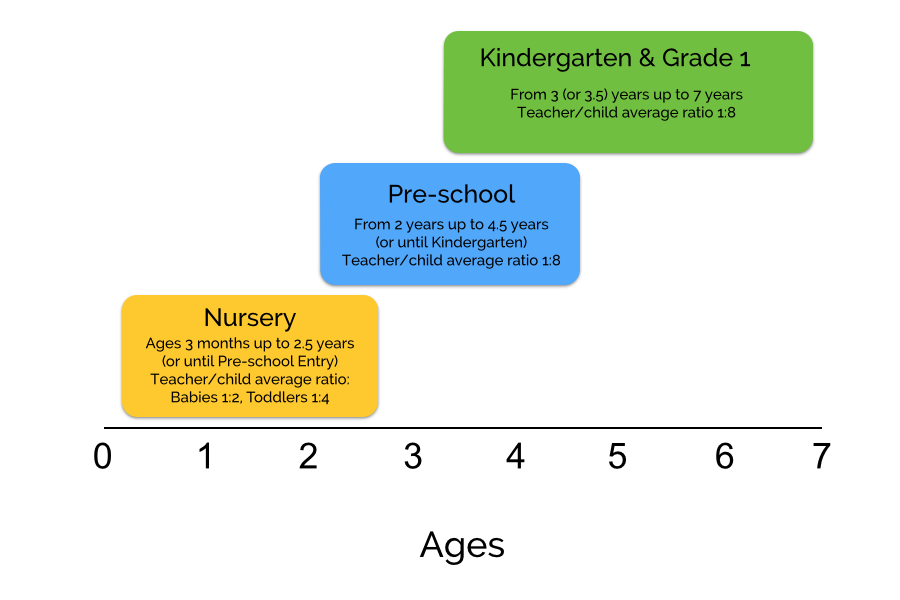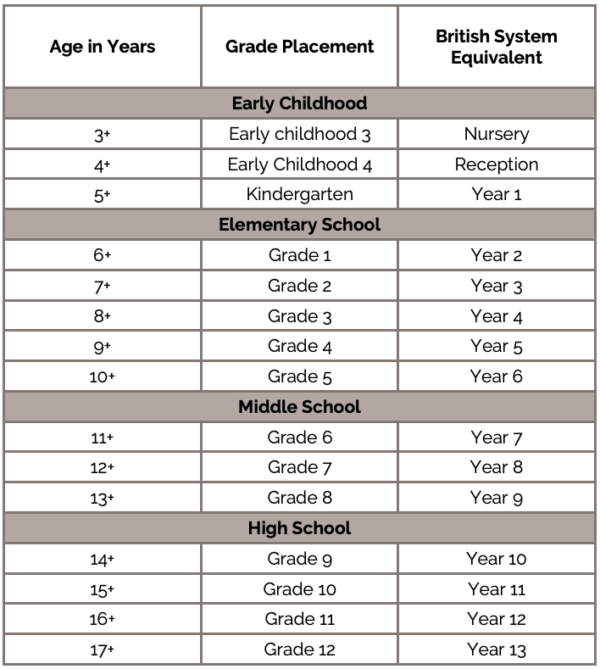Deciding on the right age for your child to start school is a significant milestone that can influence their academic, social, and emotional development. While some parents may feel pressure to enroll their child early, others may wonder if it’s better to wait until their child is a little older and more mature. The question, “Which age is best for school?”, doesn’t have a one-size-fits-all answer. Instead, it depends on various factors, including the child’s developmental readiness, legal requirements, and family circumstances.
What Is the Ideal Age for Starting School?
Starting school is a critical step in a child’s life, marking the beginning of formal education. But what is the ideal age to start school? The answer varies depending on where you live, your child’s unique developmental pace, and the educational philosophy you subscribe to.
Global Norms and Variations: Around the world, the age at which children start school typically ranges from 4 to 7 years old. For instance:
- United States: Children usually start kindergarten at age 5 or 6.
- United Kingdom: The compulsory school age is 5, with many starting Reception (the first year of primary school) at age 4.
- Finland: Children start formal schooling at age 7, with an emphasis on play-based learning until then.
- Japan: The typical starting age for elementary school is 6.
These variations reflect different cultural attitudes towards early childhood education and the belief in what age children are best equipped to handle the demands of school.
Historical Perspective: The idea of the “best” age for starting school has evolved significantly over time. In the early 20th century, formal education often began at a much later age, with children not starting school until 7 or 8. However, as education systems expanded and the importance of early childhood education became more recognized, the starting age gradually lowered.
Today, most countries have settled on an age range that reflects a balance between ensuring children are developmentally ready for school while also providing early access to education.

Factors to Consider When Deciding the Best Age for School
Determining the best age for your child to start school involves more than just following legal requirements or going with the flow of societal norms. It requires a careful consideration of various factors that can impact your child’s long-term success and well-being.
Child’s Developmental Readiness
One of the most crucial factors to consider is your child’s developmental readiness. Children develop at their own pace, and their readiness for school depends on their cognitive, emotional, social, and physical development.
- Cognitive Development: Cognitive development refers to your child’s ability to think, learn, and solve problems. Before starting school, children should have basic cognitive skills such as recognizing letters, numbers, and shapes, understanding simple instructions, and beginning to develop critical thinking skills. However, cognitive development varies widely among children, and it’s essential to assess whether your child can engage with the learning material at school.
- Emotional and Social Development: Emotional maturity and social skills are equally important. A child who is emotionally ready for school can manage their feelings, cope with separation from parents, and interact positively with peers and teachers. Socially, children should be able to share, take turns, and participate in group activities. Emotional and social development is often a strong indicator of how well a child will adjust to the school environment.
- Physical Readiness: Physical development includes both fine motor skills (such as holding a pencil or using scissors) and gross motor skills (such as running or jumping). A child who is physically ready for school can handle the physical demands of a school day, including sitting still, following a routine, and participating in physical education.
Checklist for Assessing Developmental Readiness:
- Does your child show curiosity about learning new things?
- Can they follow simple instructions and pay attention for short periods?
- Are they comfortable being away from you for several hours?
- Do they enjoy playing with other children and can they share or take turns?
- Are they physically active and able to manage basic self-care tasks?
By answering these questions, you can get a sense of whether your child is developmentally ready for school. If you’re unsure, consider seeking advice from an educator or child psychologist who can provide further insights.
Legal Requirements and School Policies
In addition to developmental readiness, it’s essential to consider the legal requirements and school policies in your region.
- Compulsory School Age: Most countries have a legally mandated age by which children must start school, known as the compulsory school age. For example, in the United States, this age varies by state, typically ranging from 5 to 7 years old. In the United Kingdom, children must start school by age 5. Knowing the compulsory school age in your area ensures that you’re complying with the law while making the best decision for your child.
- School Admission Policies: Admission policies can vary significantly from one school to another. Some schools have strict cut-off dates for enrollment based on age, while others may offer flexibility depending on the child’s readiness. It’s important to understand the specific admission requirements of the schools you’re considering. For instance, if your child is born close to the cut-off date, you may need to decide whether to enroll them as one of the youngest in their class or wait another year.
Compulsory School Age by Country
| Country | Compulsory School Age | Notes |
|---|---|---|
| United States | 5-7 years | Varies by state; kindergarten is typically the first step. |
| United Kingdom | 5 years | Children often start Reception at age 4. |
| Finland | 7 years | Focus on play-based learning until formal schooling begins. |
| Japan | 6 years | School year starts in April, with most children starting at 6. |
Understanding these legal and policy frameworks helps you align your child’s school start with both their readiness and the rules governing education in your area.
Family and Cultural Considerations
The decision of when to start school isn’t made in isolation. Family dynamics and cultural beliefs can play a significant role in shaping your decision.
- Family Dynamics: Every family has its own unique circumstances that can influence when a child starts school. For example, a child with older siblings may be more eager to start school early, while a first-born child might benefit from an extra year at home. Additionally, if both parents work full-time, they may consider early schooling to accommodate childcare needs. However, it’s crucial to weigh these practical considerations against your child’s readiness to ensure their well-being.
- Cultural Beliefs: Cultural norms and values often guide decisions about the appropriate age for school. In some cultures, starting school early is seen as a way to get ahead academically, while in others, there’s a strong emphasis on allowing children more time to develop through play and informal learning. For example, Scandinavian countries prioritize the latter, with formal schooling starting later, but with high levels of success and well-being among students.
Understanding how these family and cultural factors influence your decision can help you make a choice that aligns with your values and circumstances.
Educational Trends and Research Findings
Finally, it’s important to consider the latest educational trends and research findings when determining the best age for school.
- Research on School Starting Age: Numerous studies have explored the impact of starting school at different ages. Research often suggests that starting school later (around age 6 or 7) can lead to better academic outcomes, as older children are generally more mature and ready to learn. For instance, a study published in the journal Developmental Psychology found that children who started school later had better self-regulation skills, which are crucial for academic success.
- Educational Approaches: Different educational philosophies advocate for varying starting ages. For example, the Montessori approach encourages children to start school around age 3 or 4, focusing on self-directed learning and independence. In contrast, the Waldorf approach suggests starting formal education at age 6 or 7, emphasizing imaginative play and artistic expression in the early years.
Staying informed about these trends and research findings can help you make a decision that is supported by evidence and aligns with your educational values.

Pros and Cons of Starting School at Different Ages
When deciding the best age for your child to start school, it’s essential to weigh the pros and cons of starting early versus waiting until they are older. Each approach has its own set of advantages and potential challenges that can significantly impact your child’s educational journey.
Starting School Early (Age 4-5)
Advantages:
- Early Socialization: One of the primary benefits of starting school early is that it provides children with an opportunity to socialize with their peers from a younger age. This early social interaction can help children develop essential social skills, such as sharing, taking turns, and working collaboratively in groups. These skills are foundational for success not only in school but also in later life.
- Exposure to Learning Environments: Starting school early introduces children to structured learning environments where they can begin to develop academic skills like reading, writing, and basic mathematics. Early exposure to these subjects can foster a love of learning and help children become more comfortable with academic challenges.
- Adaptability: Children who start school early often learn to adapt quickly to routines and expectations. This adaptability can be beneficial in helping them navigate transitions and changes, such as moving to higher grades or different schools in the future.
Challenges:
- Potential for Developmental Gaps: While some children are ready to start school at age 4 or 5, others may not be developmentally prepared. Starting school too early can result in struggles with academic tasks, leading to frustration and a lack of confidence. For instance, a child who is not yet proficient in fine motor skills may find it challenging to write or complete art projects, which can affect their overall experience.
- Pressure to Keep Up Academically: Children who start school early may face pressure to keep up with older classmates, especially in mixed-age classrooms. This pressure can lead to stress and anxiety, particularly if the child feels they are falling behind. Moreover, younger children in the class may have difficulty keeping pace with the curriculum designed for slightly older students.
- Limited Playtime: Early schooling can sometimes reduce the time available for free play, which is critical for a child’s creativity and emotional development. Play is not only a way for children to explore their environment but also a vital component of learning how to solve problems, develop language skills, and regulate their emotions.
Starting School at a Later Age (Age 6-7)
Advantages:
- Increased Maturity: Waiting until age 6 or 7 to start school often means that children are more emotionally and socially mature. This maturity can make them better equipped to handle the structure and demands of a classroom setting. Older children are generally more capable of managing their emotions, following instructions, and working independently.
- Better Academic Focus: With increased age often comes better focus and concentration. Older children may find it easier to sit still for extended periods, pay attention during lessons, and complete tasks without getting easily distracted. This enhanced focus can lead to better academic outcomes and a more positive attitude toward learning.
- Readiness for Complex Concepts: By starting school later, children may be more prepared to grasp complex concepts and skills that are introduced in the early grades. For example, they might find it easier to understand abstract ideas in subjects like math and science, which can lead to a stronger foundation for future learning.
Challenges:
- Social Adjustment Issues: One potential downside of starting school later is the challenge of social adjustment. Children who are older than their classmates may feel out of place or self-conscious about their age. This age difference can sometimes lead to difficulties in forming friendships or feeling a sense of belonging in the classroom.
- Feeling Out of Sync with Peers: Older children who start school later might feel out of sync with their peers, particularly if they notice differences in maturity or development. This can impact their confidence and willingness to participate in group activities. In some cases, these feelings of being out of sync can persist, affecting the child’s long-term social experiences.
- Missed Early Learning Opportunities: While waiting until age 6 or 7 can offer advantages in terms of maturity, it can also mean missing out on early learning opportunities that could benefit the child. Early exposure to structured learning environments can help children develop foundational skills and a sense of curiosity that might be harder to cultivate later.
Pros and Cons of Starting School at Different Ages
| Age Group | Pros | Cons |
|---|---|---|
| 4-5 years | Early socialization, exposure to learning, adaptability | Developmental gaps, academic pressure, limited playtime |
| 6-7 years | Increased maturity, better academic focus, readiness for complex concepts | Social adjustment issues, feeling out of sync with peers, missed early learning opportunities |
This balanced comparison allows you to see the potential benefits and drawbacks of starting school at different ages. It’s essential to consider these factors in the context of your child’s unique personality, development, and the environment they will be entering.